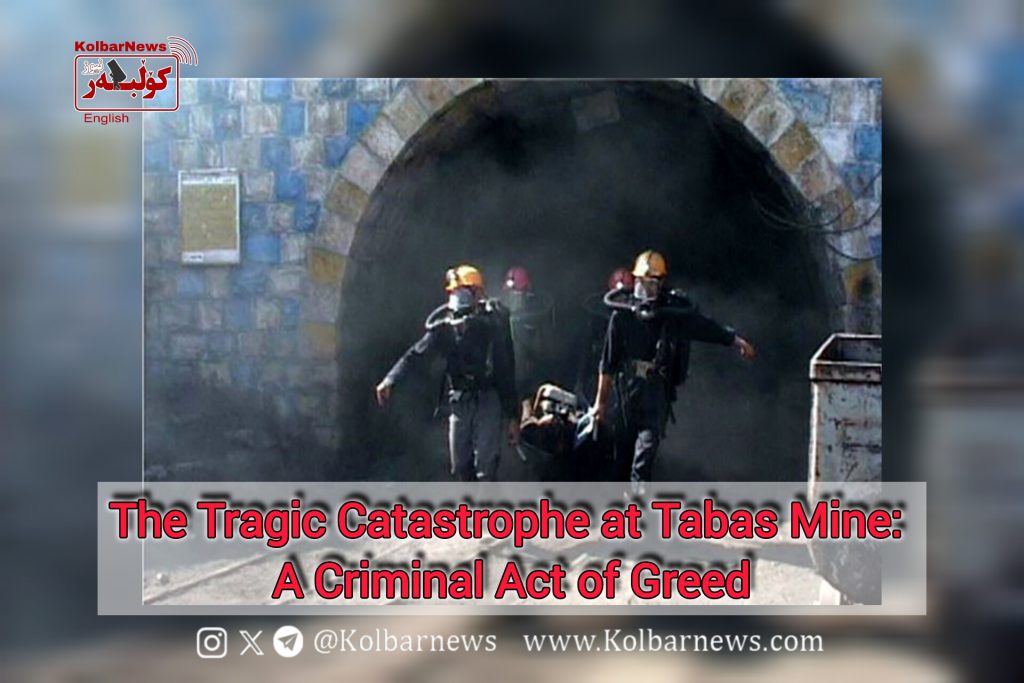
On September 21st, a heartbreaking event shocked society. An explosion at a coal mine in Tabas, South Khorasan province, resulted in the death of 54 miners and injuries to 61 others. The “Madanjoo” mine, one of the largest privately-owned coal mines, employs about 1,500 miners and extracts 400,000 tons of coal annually.
Methane gas emissions are natural in coal mines since the gas is present in the coal layers. Adequate ventilation systems are required to continuously remove this gas, and gas detectors should be installed throughout the mine to warn workers in case of abnormal gas levels. Initial investigations revealed that basic safety measures, including these ventilation systems and gas detectors, were not in place or functioning. One of the miners, struggling to hold back tears, stated: “If the ventilation and gas leak detection systems were working properly, this tragedy, which feels like a deliberate massacre of workers, would never have happened.”
However, the labor minister, without waiting for the investigation results, declared that no violations occurred and claimed the incident was merely an accident. The pro-government labor organizations subtly echoed this stance, blaming sanctions for the lack of or deteriorating safety equipment. One official stated that although the equipment is available in the market, it is expensive, and employers find it too costly to purchase. With this simplistic justification, he dismissed the deaths of multiple workers.
The newspaper Bahar, quoting a safety expert, reported that the responsible ministries had failed to fulfill their duties of overseeing the mine. Another expert, quoted by Shargh newspaper, highlighted that beyond the lack of proper safety precautions and government oversight, there was a failure in providing rescue equipment. This expert emphasized that, if safety standards had been properly implemented, thorough inspections carried out by relevant ministries, and corrective actions taken by the employer, such a disaster would not have occurred. The expert also criticized the excuse of sanctions for failing to acquire rescue equipment, noting that safety-related equipment can still be imported from countries like Turkey, making sanctions an irrelevant justification.
The deaths of 54 miners in the Tabas explosion, though the deadliest incident, are part of a long series of avoidable mining accidents in Iran. Some past incidents include:
In May 2017, an explosion at the Yurt mine in Golestan province claimed the lives of 42 workers.
On September 6, 2020, the collapse of Tunnel No. 2 at the Hojdak coal mine near Kerman resulted in the deaths of 4 miners.
In May 2021, two workers lost their lives at the Eastern Alborz coal mine in Damghan due to safety violations.
On September 22, 2021, a collapse at the Hojdak mine killed 35 miners.
In September 2023, another explosion at the Tarzeh mine killed six workers.
On June 3, 2024, a collapse at the Abnil coal mine in the village of Bibi Hayat in Kerman killed one worker and injured five others.
On June 16, 2024, a landslide at the Shazand sand and gravel mine claimed the lives of four workers, with one body still trapped under the debris.
These are just a few examples of preventable incidents caused by the lack of safety standards in Iran’s mines. The workers at Madanjoo, who were cruelly sacrificed to the greed of the mine owner and the complicit government, earned a mere 12 million tomans per month—less than $200. In such conditions, only the organization of workers into their own unions and associations can prevent capitalists and the government from carrying out such criminal attacks on workers’ lives and stop the recurrence of these tragedies.

